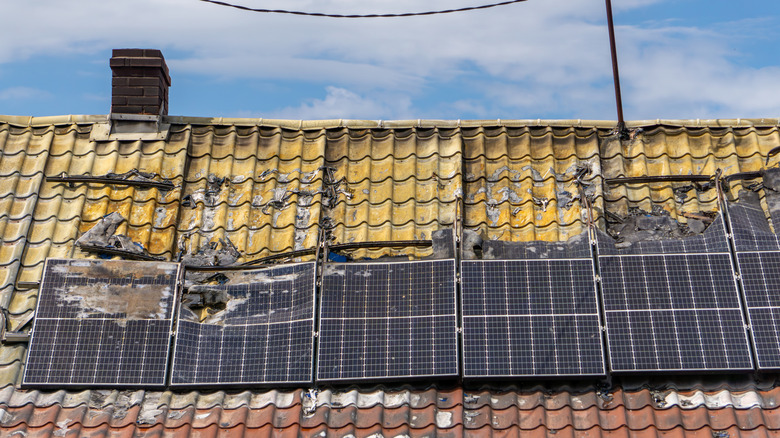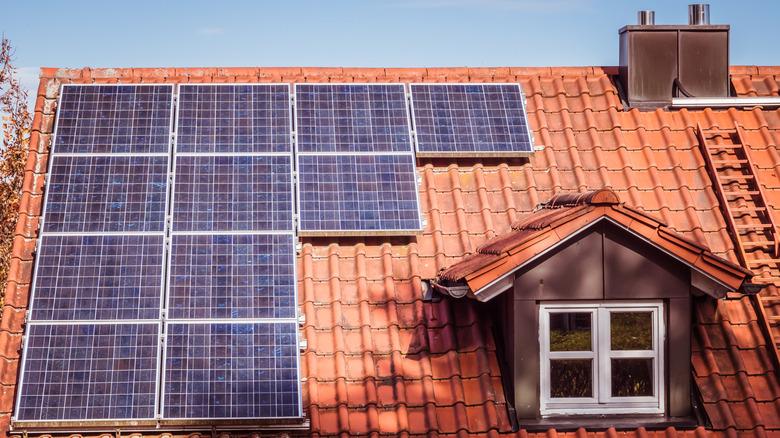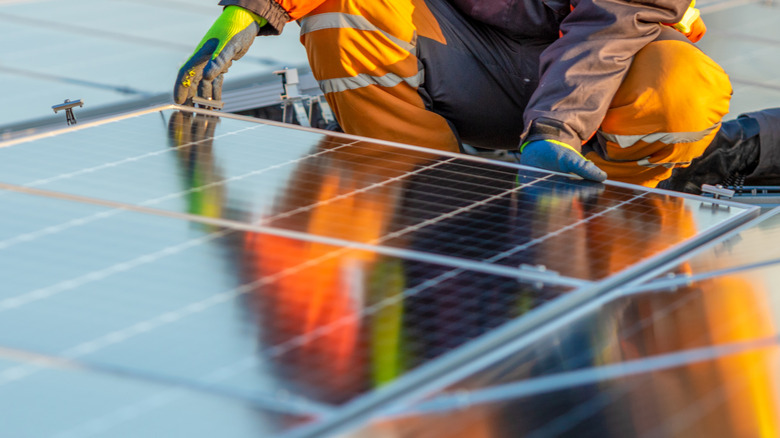Are Your Solar Panels Reaching The End Of Their Life? How To Handle Them
By 2024, the U.S. had exceeded five million residential solar installations. That number is expected to reach 10 million installations by 2030. It's pretty clear that many people believe investing in solar panels is worth it based on how long they last, among other factors. Whether you're installing a brand new solar system or you just moved into an older home with panels on the roof, you may be wondering how much longer they will last. Currently, residential solar panels have a 20- to 30-year lifespan, after which time, most are recycled or repurposed.
All solar panels wear out eventually. When they do, you can't just remove them and put them out with the trash. Some of the materials they may contain are considered hazardous waste, such as leachable lead and cadmium. Depending on how harmful the materials are to human health, you might have to contact your local municipality to find out how to safely dispose of them. In most cases, the panels can be recycled, either through a local recycler, your installer, or the panel manufacturer. Even if you're installing a new solar panel system in the same place as an old one, you run into the same issues. Long story short, be prepared to do some research to find out safe management options when your current panels reach the end of their lifespan.
You might not have to do anything with old solar panels
Are your existing solar panels already two to three decades old? They are at the end of their useful lifespan, per most manufacturers. However, they don't simply work at maximum efficiency for up to 30 years and then suddenly stop working. In fact, the panels may continue to work for 40 to 50 years — their performance degrades slowly at an average annual rate of 0.3% to 0.55%. Based on this range, a typical panel should be operating at 80% to 92% efficiency after 25 years of use. Environmental factors like excessive heat, dust, snow, hail, and wind can reduce the efficiency of a panel by up to 60%.
As long as the panel is continuing to produce an adequate amount of electricity, you can keep using it. You might even be able to extend the lifespan by keeping your solar panels clean and efficient with WD-40 or other recommended care products. However, no matter what kind of maintenance you do, the panels will continue to degrade each year. Even if your current solar panels are still working, you may want to install new ones. Modern solar panels are more efficient than their predecessors from the get-go, and that fact alone might be enough to convince you to make the switch. What's more, installing solar panels may earn you an exciting credit on your energy bill or a solar energy rebate, making a new system more affordable.
You can't just put old solar panels out to the curb
It's estimated that the U.S. will have one million tons of solar panel waste by 2030 as panels installed decades ago reach the end of their useful lifespan and get removed or replaced. The country may have 10 million tons of panels that need to be disposed of or recycled by 2050. You can't put these panels in your recycling bin with the takeaway containers and plastic bottles, though. You need to find a local company that can handle these products safely. Specialist recyclers can salvage up to 95% of the materials in used solar panels. Check with the installer or manufacturer of your old panels — or the new ones you bought to replace them — for advice. Check online recycling resources, like Earth911, which provides a recycling center directory refined by zip code.
You can also contact your state's environmental agency to find options for recycling the panels. The federal EPA has a comprehensive list of links to state agencies on their website. Some states, like California, Hawaii, New Jersey, North Carolina, and Washington, have strict legal regulations for solar panel recycling, so it is worth checking carefully. Beyond recycling, some people choose to use old but working panels for lower-energy needs. Giving them a new purpose negates the need to recycle them. For example, some people remove the panels from their home and reinstall them on a remote or off-grid cabin. You could also donate solar panels to a charity like Good Sun that reuses them for projects in low-income communities.


